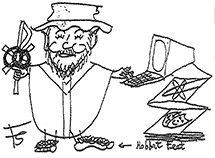But I want to be challenged!
And some challenges have come. The first was the nobody knows the reason for the existence of the universe. My comment is that Einstein himself, followed by others, says that the most amazing thing is that we are here at all, and that there is anything to be known. But that is scientiifc “knowledge” - or lack of knowledge. Religious faith is something different: it trusts in a Source of our Being. As one of my friends said: he did not care about knowing about how the wrold was created, he just wanted to trust that there was some One at the other end of the telephone!.
And then, a respondent said what the writer Thomas Hardy said ,100 years ago, that we made up God, rather than God made up us. What this means to me is that we have the intelligence and spirit to understand a source of our being who is quite other than ourselves, and quite other than the universe around us, but whom we can trust and we hold Him/Her responsible for us being here and now!
Then one said that religious moderates create religious extremists. In my experience and from reading history, I would say that religious extremists create religious extremists. Just read the papers or see the TV news - but not the extremist ones!
I am trying to challenge our readers to respond to many things we find in science, and to be thankful for these things, whether they are technical discoveries or ideas and theories. Science reveals a lot about ourselves and the universe around us. If we are believers, we trust the Source of these things as a Friend who can be understood, just as we understand human friends. As we get closer to that Source-Person, we see our own reflection in new lights, just as we do when we get friends with other human beings = or indeed friendly with animal and phsyical nature.
I am also trying to acquaint readers with some of the scientists and others who have faced up to the meaning of “God” in their lives and in human destiny, because there are some extraordinary people among them. These people enjoy being challenged, and find doubt a means of strengthening trust and faith.
For example, John Polkinghorne, a life-long outstanding theoretical physicist, who keeps his faith and develops it, becoming an Anglican priest in mid years, has lived with a faith which responds to doubt, a faith checked out by reason, a faith tested and tried in a critical academic climate in which the historicity of scriptures and the credibility of doctrines were constantly challenged.
I studied with him briefly and over the years read his work and corres-ponded, and have valued the insights which come from science and also from belief. I myself had the good fortune to have a loving mother who taught me a few simple things about Christianity, and a loving father who was an agnostic and brought me up on evolution and Freud. Between the two, I learned to have a reasoned faith. ( I switched to Carl Jung!)
As human beings we are programmed to respond to light, natural light and light in the mind. The latter can give you enlightened doubt or enlightened faith, or both.

